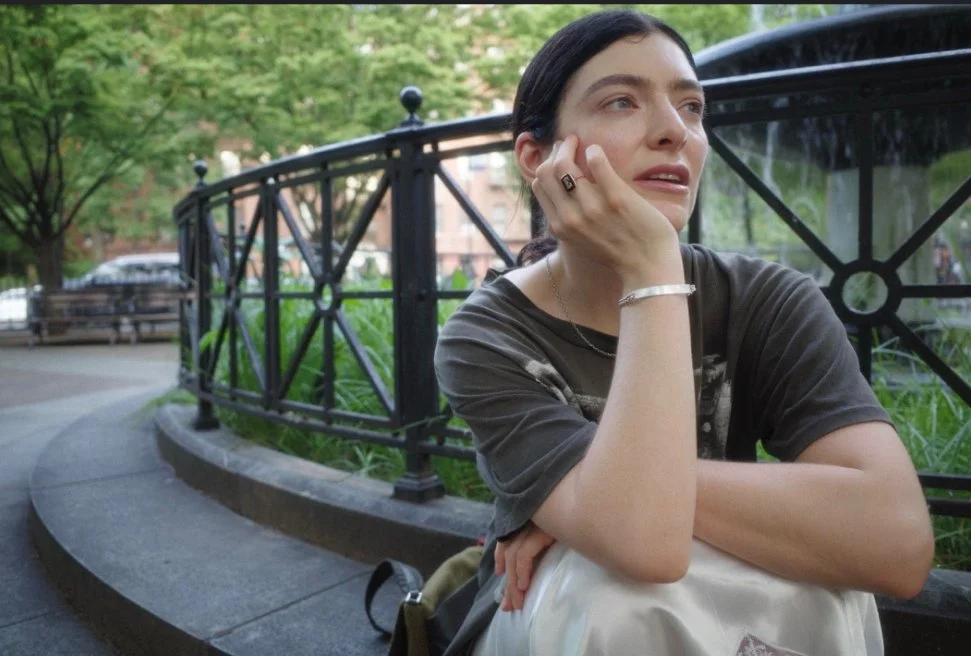
Virgin isn’t easy to digest.
Do you have the stomach for it?
By Brianna Perez Golini
On June 27, Ella Marija Lani Yelich-O'Connor, better known as Lorde, released her fourth studio album, “Virgin”.
A project born out of transformation. A chance for Lorde to throw out her inhibitions and reinvent herself. Throughout the album she sings of desire, gender identity, and familial expectations. Offering a new perspective to her catalogue.
“It’s good for the art to be in the soup a bit more,” said Lorde in an interview with Zane Lowe.
Lorde tells Lowe that the quest for “Virgin” was born out of a mental breakdown in London. From that, she plugged back in and moved to Manhattan.
With moving, Lorde befriended artists and read a lot of books. She went through a breakup, came to terms with an eating disorder, and began to inhabit a more fluid understanding of her gender identity.
This vast set of circumstances – moving to and finding oneself in “the soup” – has precipitated so much art, that it almost feels too obvious to point out that any future album would be rooted in her rebirth.
“Virgin” articulates a world of possibility – her relationship with her body, finding liberation, and, well, sex – but it’s most lyrically and sonically tangible in the opening track, “Hammer”.
Lorde described “Hammer” directly as “an ode to city-life and horniness”, giving permission for unabashed sexual desire to co-exist with emotional introspection.
The album opens with:
“There’s a heat in the pavement, my mercury’s raising, don’t know if it’s love or if it’s ovulation,” Mixing hormonal awareness with a heightened sense of attraction.
The production by Jim-E Stack and Buddy Ross is riddled with swelling synths and driving beats, reflecting a sexual tension that bubbles up but never fully explodes, lending a thick sense of intimacy to the chorus.
“Hammer” is bold, visceral, and unfiltered – a fitting gateway into the deeply personal landscape of “Virgin”.
A recurrent theme throughout the album is how Lorde chameleons herself, shapeshifting to protect herself from vulnerability. In “Shapeshifter” Lorde interrogates the stain that intimacy leaves on her, describing all the personas she became for others in an attempt to protect or please a long-term relationship or a sexual partner.
She's been powerful and passive, desired and difficult, unpredictable and mysterious, alluring and moral – anything from a blessing to a burden.
Lorde vividly depicts a conflict between strength and impulsivity, and the dichotomy between her desire for detachment and her desire for lust.
She grows tired of putting up a front – “I’ve been up on the pedestal, but tonight I just wanna fall.”
The refrain, “I'm not affected,” serves less as a proclamation of her successful detachment, but instead as a grounding mantra repeated through clenched teeth.
Yet despite her efforts – “I’m reckless… Give ’em nothing personal” – her pulse races, she can’t sleep, and all rationale seems to crumble. The repeated push‑and‑pull, kicking him out, bringing him in, insisting you're unaffected – betrays a deeper emotional turmoil.
Lorde describes “Virgin” as a love letter to her mom, as she came into some real understanding in femininity and womanhood, and unlocked a deeper connection with her mother. She acknowledges the lineage of women who came before her and made her who she is, and highlights generational trauma throughout multiple tracks, but the most cathartic release lyrically and acoustically in relation to this is in track five, “Favorite Daughter”.
She expresses devotion to both her audience and her mother. The lyrics, “Everywhere I run, I’m always running to you,” dig into her thesis of running to stability in the arms of another person – whether that person be her mother or partner – a thread connecting every song.
In “Clearblue” Lorde strips herself down to skin and bones in a devastating ballad.
Drenched in metaphors, “Clearblue” sings of unprotected sex and pregnancy tests, highlighting the flood of emotions that goes through your body while glorifying the idea of the desired result. This world of possibility isn’t about lust anymore – it’s the simultaneous fear and excitement surrounding whether or not she’s pregnant.
“There's broken blood in me, it passed through my mother from her mother down to me” She sings.
She is so infatuated with the idea of being released from her own lineage and creating her own, all catalyzed by the ecstasy she experiences with another person. She places us right next to her in the anxiety-filled aftermath with the opening lyrics “After the ecstasy, testing for pregnancy, praying in MP3” and we swim in these emotions alongside her, riding the longing out until the end.
“GRWM” describing her checklist for getting ready to be a grown woman is incomplete without a chipped tooth, scarred skin, wide hips, and her mother’s trauma; admitting dishonesty to your friends and family, and shielding your shame by blaming it on “Current Affairs”.
“Broken Glass” and “If She Could See Me Now” acting as a victorious triumph over her battle with her body and defeating the enemy of constant caloric arithmetic.
“What Was That” , her first letter to us, written with the freedom she has found as a writer and person; and “Man of the Year” formally introducing us to her masculinity and its inner power coming to surface.
Lorde is self-admittedly an untechnical writer and producer, remaining true to her nature of never following the “correct” format of a song, but she’s a master at telling stories with sound and has a powerful, innate sense of rhythm. The lack thereof made room for her character and the story of her experiences to shine through, and fill the album with humanity and vulnerability.
“Virgin,” while reportedly less ambitious, is extremely visceral and its lyricism possesses the most unique yet plain imagery I have ever heard, creating a language unique to the album and forging an intensely emotional connection between Lorde and each listener.
The whole album is about her being free from things that previously took away her agency: a corrupt industry, power dynamics, past relationships, casual sex, her mother, her body, and her past self.
“Virgin”, though about her openness with her body, is less about Lorde’s virginity and more about getting to a place where you feel naked and awkward emotionally. This level of vulnerability speaks to purity, newness, and something essential.
This album is a testimony to rebirth, and being ready to not have all the answers. It follows strict guidelines to reinvention that can not be messed with. Lorde has made way for this change in her own life, tearing down the walls her former self built. She encourages listeners to embrace this change, and swallow fear whole. Here’s what you can do to channel your rebirth.
Virgin Diet
Do: spill your guts
Do: make a photo album of your current favorite pictures
Do: use the x-ray emoji
Do: gatekeep your favorite restaurant
Don't: avoid discomfort
Don't: be nonchalant and express wholeheartedly
Don’t: ignore your mom
Don't: text your ex
photo via Lorde’s newsletter
